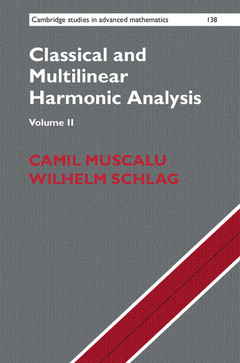Description
Classical and Multilinear Harmonic Analysis
Classical and Multilinear Harmonic Analysis 2 Volume Set Series
Authors: Muscalu Camil, Schlag Wilhelm
This contemporary graduate-level text in harmonic analysis introduces the reader to a wide array of analytical results and techniques.
Language: English
Subject for Classical and Multilinear Harmonic Analysis:
Approximative price 74.82 €
In Print (Delivery period: 14 days).
Add to cart
Publication date: 01-2013
339 p. · 15.5x23.1 cm · Hardback
339 p. · 15.5x23.1 cm · Hardback
Description
/li>Contents
/li>Biography
/li>
This two-volume text in harmonic analysis introduces a wealth of analytical results and techniques. It is largely self-contained and useful to graduates and researchers in pure and applied analysis. Numerous exercises and problems make the text suitable for self-study and the classroom alike. The first volume starts with classical one-dimensional topics: Fourier series; harmonic functions; Hilbert transform. Then the higher-dimensional Calderón?Zygmund and Littlewood?Paley theories are developed. Probabilistic methods and their applications are discussed, as are applications of harmonic analysis to partial differential equations. The volume concludes with an introduction to the Weyl calculus. The second volume goes beyond the classical to the highly contemporary and focuses on multilinear aspects of harmonic analysis: the bilinear Hilbert transform; Coifman?Meyer theory; Carleson's resolution of the Lusin conjecture; Calderón's commutators and the Cauchy integral on Lipschitz curves. The material in this volume has not previously appeared together in book form.
Preface; Acknowledgements; 1. Leibniz rules and gKdV equations; 2. Classical paraproducts; 3. Paraproducts on polydiscs; 4. Calderón commutators and the Cauchy integral; 5. Iterated Fourier series and physical reality; 6. The bilinear Hilbert transform; 7. Almost everywhere convergence of Fourier series; 8. Flag paraproducts; 9. Appendix: multilinear interpolation; Bibliography; Index.
Camil Muscalu is Associate Professor of Mathematics at Cornell University, New York.
Wilhelm Schlag is Professor in the Department of Mathematics at the University of Chicago.
Wilhelm Schlag is Professor in the Department of Mathematics at the University of Chicago.
© 2024 LAVOISIER S.A.S.




